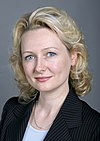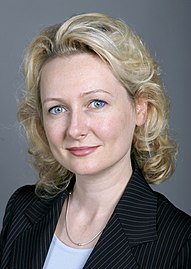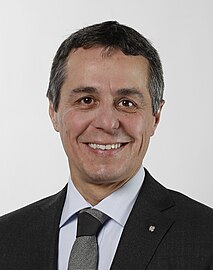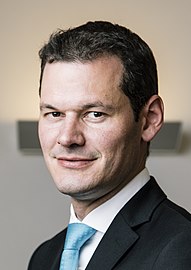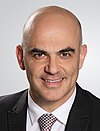
The Federal Council is the federal cabinet of the Swiss Confederation. Its seven members also serve as the collective head of state and government of Switzerland. Since after World War II, the Federal Council is by convention a permanent grand coalition government composed of representatives of the country's major parties and language regions.
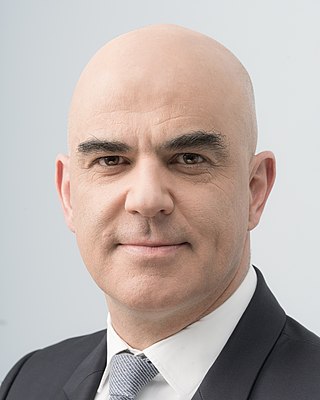
Alain Berset is a Swiss politician who served as a Member of the Swiss Federal Council from 2012 to 2023. A member of the Social Democratic Party (SP/PS), he headed the Federal Department of Home Affairs from when he took office. Berset served as President of the Swiss Confederation for 2018 and 2023.

Didier Eric Burkhalter is a Swiss politician who served as a Member of the Swiss Federal Council from 2009 to 2017. A member of FDP.The Liberals, he was President of the Swiss Confederation in 2014.
A by-election to the Swiss Federal Council was held in Switzerland on 16 September 2009, after incumbent Federal Councillor Pascal Couchepin announced his intention to retire on 31 October 2009.
Two by-elections to the Swiss Federal Council were held in Switzerland on 22 September 2010, after federal councillors Moritz Leuenberger (SP) and Hans-Rudolf Merz announced they would step down from the Federal Council towards the end of the year. The by-elections resulted in the elections of Simonetta Sommaruga from the SP and Johann Schneider-Ammann from the FDP, resulting in no change in the partisan composition of the council. It also resulted in the first majority of women on the Federal Council in its history, with Sommaruga joining Micheline Calmy-Rey, Doris Leuthard and Eveline Widmer-Schlumpf.
An election for all seven members of the Federal Council, the government of Switzerland, was held on 14 December 2011, following the federal election on 23 October 2011. Micheline Calmy-Rey announced she would not run for re-election to the council. According to a traditional informal convention, the successor has to come from the French-speaking or Italian-speaking part of Switzerland. The candidates for her post announced by their respective cantonal sections are Alain Berset (Fribourg), Pierre-Yves Maillard (Vaud), Stéphane Rossini (Valais), and Marina Carobbio (Ticino).

Pierre Maudet is a Swiss and French politician. A former member of FDP.The Liberals, he was the mayor of Geneva from 1 June 2011 to 31 May 2012.
The 2007 Zürich cantonal elections were held on 15 April 2007, to elect the seven members of the cantonal Executive Council and the 180 members of the Cantonal Council.

Guy Bernard Parmelin is a Swiss Federal Councillor and head of the Department of Economic Affairs, Education and Research. A member of the Swiss People's Party (SVP/UDC), he has been a member of the Federal Council since 2016, and has led the Department of Economic Affairs, Education and Research since 2019. He previously led the Department of Defence, Civil Protection and Sports between 2016 and 2018. He served as president of Switzerland in 2021, having previously served as vice president of Switzerland in 2020.
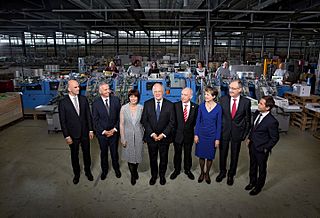
An election for all seven members of the Federal Council, the Government of Switzerland, was held on 9 December 2015, following the federal election on 19 October 2015, for the 2016–2020 term.
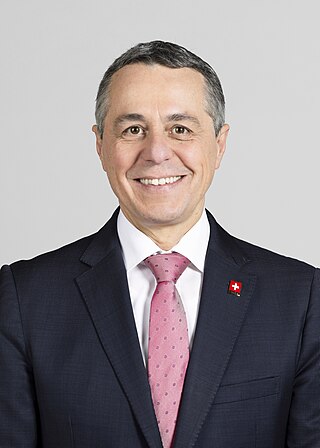
Ignazio Daniele Giovanni Cassis is a Swiss physician and politician who has been a Member of the Swiss Federal Council since 1 November 2017. A member of FDP.The Liberals, Cassis was elected to the Federal Council on 20 September 2017 following the resignation of Didier Burkhalter. He has headed the Federal Department of Foreign Affairs since he took office. On 8 December 2021, Cassis was elected President of the Swiss Confederation for 2022.
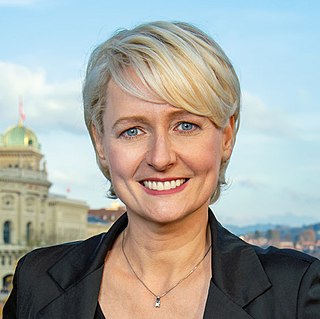
Isabelle Moret is a Swiss politician who served as President of the National Council from 2019 to 2020. A member of FDP.The Liberals since its foundation in 2009, she first entered the National Council in 2006 as a member of the Free Democratic Party (FDP/PRD). Moret is a resident of Yens-sur-Morges in the canton of Vaud.
An election for all seven members of the Federal Council, the Government of Switzerland, was held on 11 December 2019, following the federal election on 20 October 2019, for the 2020–2024 term.

Federal elections were held in Switzerland on 22 October 2023 to elect all members of the National Council and Council of States. The elections were followed by elections to the Federal Council, Switzerland's government and collegial presidency, on 13 December.
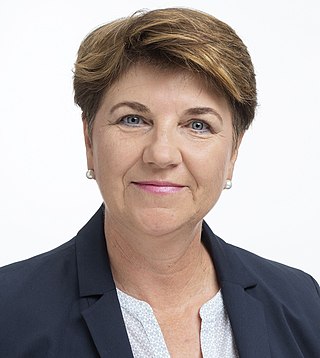
By-elections to the Swiss Federal Council were held on 5 December 2018, after federal councillors Johann Schneider-Ammann (FDP-BE) and Doris Leuthard (CVP-AG) announced in September they would leave the Council effective 31 December of the same year.

By-elections to the Swiss Federal Council were held on 7 December 2022, after federal councillors Ueli Maurer (SVP-ZH) and Simonetta Sommaruga (SP-BE) announced they would leave the Council effective 31 December of the same year. The parliament elected Albert Rösti and Élisabeth Baume-Schneider respectively to replace them.
An election for all seven members of the Federal Council, Switzerland's government, were held on 13 December 2023 for the 2024–2028 term. It followed the federal election held a month earlier and partly depended on its results.
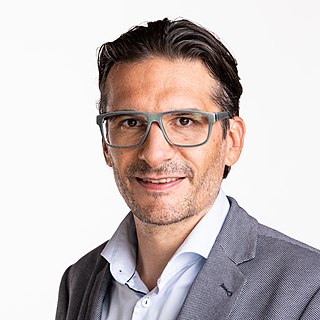
Gerhard Andrey is a Swiss entrepreneur and politician who currently serves as a member of the Swiss National Council for the canton of Fribourg. A member of the Green Party of Switzerland Andrey was the Green Party's candidate for Federal Council in the 2023 Federal Council election to unseat incumbent FDP federal councillors, which did not succeed.
By-elections to the Swiss Federal Council will be held on 12 March 2025, after federal councillor Viola Amherd announced that she will leave the Council at the end of March of the same year. There had been rumour about her resignation for some time. The announcement overshadowed the main topic of her press conference on January 15, 2025: the reorganisation of compulsory service in the army and civil protection.



